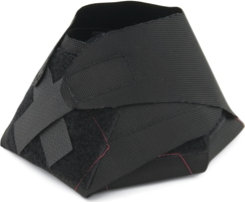When horses eat off the bare ground they easily consume particles of sand or dirt. A way to mitigate consuming sand would be to keep feed of the ground by using a hanging feeder, large feed bucket and/or a mat on the ground. Most tack or feed stores will have or can order stall mats for this use. A trip to your local auto parts store to buy a truck bed mat is another solution. Even then, horses have that danged particular habit of tossing their feed out of most containers in order to get to the soft hay residue at the bottom. If you horse regularly eats off the ground, has loose manure or seemingly has gut aches more often that others there is a simple test you can do to see how much sand there is in the horse’s gut. You’re going to need a clear jar and lid, such as a Mason jar for canning.
.jpg)
Collect 6 to 8 balls or ball sized elements of manure that have not touched the ground and place them in the jar. Fill the jar almost full of water. Place the lid on the jar then shake up for 20-30 seconds then let stand. Within 20-30 minutes or so, the sand will separate from the manure and be evident in the bottom of the jar.
.jpg)
The jar in the picture LEFT shows A LOT of sand contained in those balls of manure. The Vet told us there may be as much as 80 lbs of sand in this horse’s gut. The jar in the above picture RIGHT shows a fairly small degree of sand in the manure. You should always consult a Veterinarian, if not in person then at least over the phone. We have a great vet. She drives near 100 mile round trips to get to us – couldn’t get by without her, but that’s another story.
We were already feeding this horse in a large feed bin, so what we did to treat this horse eating sand was to give him a dose of pro-biotics to ensure he has good enzymes in his gut, then put a scoop of Sand Clear Pellets in his morning grain for seven days, then continue to monitor his manure. This seemed to clear up his loose manure. If this is a chronic case, you may have to repeat this treatment more often or even one week per month.



















